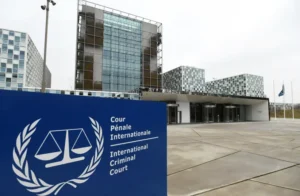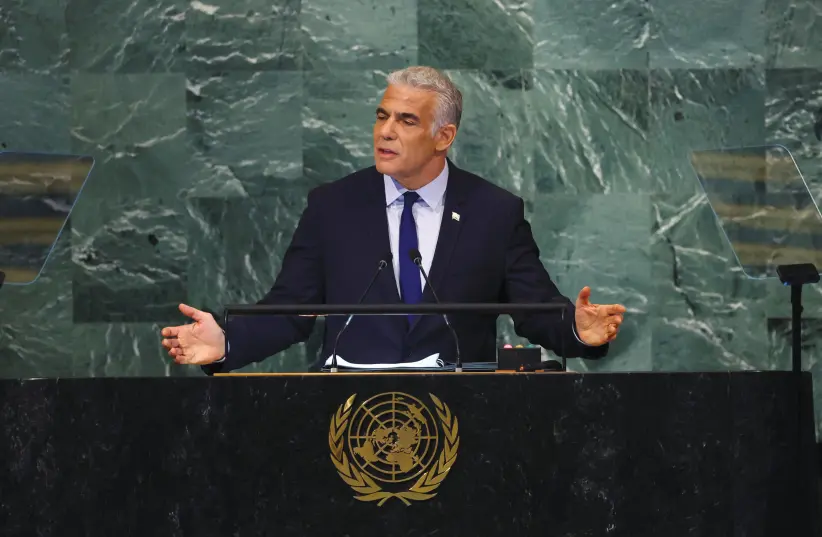The PM’s letter aims to stop a UN General Assembly vote on the status of the disputed territories in the West Bank.
The Palestinian attempt to bring the status of disputed territories to international tribunes is meant to delegitimize Israel, Prime Minister Yair Lapid wrote in a letter to over 50 world leaders on Monday, asking them to stop a UN General Assembly vote on the matter.
The UNGA’s Fourth Committee voted 98-17 earlier this month to ask the International Court of Justice to consider whether the IDF’s ongoing presence in Judea and Samaria, east Jerusalem and the Golan can be considered de-facto annexation after 56 years. The resolution questions the status of Jerusalem, ignoring Jewish ties to its holiest site, the Temple Mount, and referring to it only as al-Haram al-Sharif (the Noble Sanctuary).
“[The] resolution is the outcome of a concerted effort to single out Israel, to discredit our legitimate security concerns, and to delegitimize our very existence.”
Prime Minister Yair Lapid
The resolution must be approved in another, full UN General Assembly vote – which Lapid seeks to prevent – before the question goes to The Hague.
Efforts to prevent a full UNGA vote
Lapid said that the “resolution is the outcome of a concerted effort to single out Israel, to discredit our legitimate security concerns, and to delegitimize our very existence.”
“It has long been accepted that the status of disputed territory will be subject to direct negotiations between Israel and the Palestinians,” Lapid wrote. “A one-sided change to such a policy will have detrimental effects on the entire region. Bringing the matter before the ICJ expressly contravenes the principle of direct negotiations accepted by Israel, the Palestinians and the international community, and will only play into the hands of extremists, further polarize the parties, and undermine the positive work that has been done over the past few years.”

The prime minister pointed out that his government “promoted high-level contacts with the Palestinian Authority and has undertaken numerous confidence-building measures on the ground to promote the prosperity and well-being of the Palestinians.”
Lapid called on world leaders to exert their influence on the PA so they do not bring the resolution to a final vote, but, failing that, he said he expects Israel’s friends to vote against it.
The Prime Minister’s Office sent the letter to leaders from the United Kingdom, France, Croatia, Romania, Bulgaria, The Netherlands, Slovakia, Latvia, Georgia, Brazil, Uruguay, Peru and Vietnam, among other countries.
How can Israel’s government respond?
Following the vote nearly three weeks ago, Lapid instructed the government to prepare a “security and diplomatic toolbox” to respond.
“The way to resolve the conflict does not pass through the halls of the UN or other international bodies, and the Palestinians’ move at the UN will have consequences,” the prime minister warned.
Ultimately, the resolution was not carried out and Arab countries attacked Israel. This in turn led to the 1948 War of Independence, which saw Israel defeat its Arab neighbors and achieve independent statehood.
However, it is still enshrined as an important part of Israeli history, with a street being named “November 29 Street” in Jerusalem and the partition plan being mentioned in the Declaration of Independence:
“On the 29th November, 1947, the United Nations General Assembly passed a resolution calling for the establishment of a Jewish State in Eretz Israel; the General Assembly required the inhabitants of Eretz Israel to take such steps as were necessary on their part for the implementation of that resolution. This recognition by the United Nations of the right of the Jewish people to establish their state is irrevocable. This right is the natural right of the Jewish people to be masters of their own fate, like all other nations, in their own sovereign state.”
In later years, the date would also become known as the annual International Day of Solidarity with the Palestinian People, a United Nations-organized event observed since 1978.
Created as a result of UN General Assembly resolution 32/40 B in 1977, this specific date was chosen in memory of the partition plan.
This day of solidarity is still recognized and observed by events, typically held at the UN headquarters in New York and offices in Vienna, Nairobi and Geneva, as well as other places.
Many high-ranking UN officials, NGOs and other public figures tend to make statements regarding Palestine and the ongoing Israeli-Palestinian conflict in special meetings at these events. Indeed, as noted by the UN’s website, it is also the day when the UN General Assembly holds its annual debate about Palestine.

